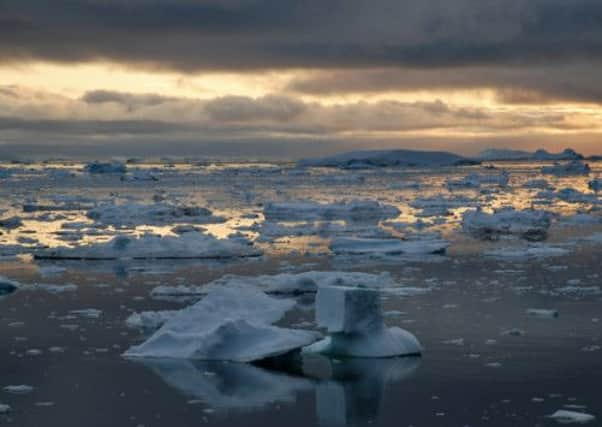Arctic melt gases may cost world $60 trillion


• Cost of dealing with methane from melting ice caps could near total world GDP
• Developing countries could be worst hit by “economic time-bomb”
• Warning of “major implications” across the globe
Advertisement
Hide AdAdvertisement
Hide AdGround-breaking analysis has found that the likely cost of methane emissions as Arctic permafrost melts is 60 trillion dollars (39 trillion pounds) globally, nearly equalling the 70 trillion dollar (46 trillion pound) value of the global economy in 2012.
The dire warning of an “economic time-bomb” comes from the first ever calculation of the potential economic impact of a scenario which some scientists consider increasingly likely – that the unprecedented thaw will trigger the release of methane from the East Siberian Sea in the polar region.
Although the sea holds only a fraction of the Arctic’s vast methane reserves, experts from the universities of Cambridge in England and Erasmus in Rotterdam, Holland warned that even the release of that relatively small proportion of the area’s methane could result in climatic catastrophe around the world.
Developing countries would be worst hit as they struggle to meet the spiralling cost of dealing with increased flooding, drought and other problems as the predicted methane release alters the climate, scientists said.
Researchers also warned that the focus of most of the current economic debate on the Arctic was wrongly skewed towards the potential multibillion dollar financial benefits of melting sea ice as access to the Arctic is opened up for more oil and gas exploration and new shipping routes.
Gail Whiteman, professor of sustainability, management and climate change at Rotterdam’s Erasmus University, who co-wrote the study for the Nature journal, said: “The global impact of a warming Arctic is an economic time-bomb....Global leaders and the World Economic Forum and International Monetary Fund need to pay much more attention to this invisible time-bomb. The mean impacts of just this one effect [from the East Siberian Sea]- $60 trillion - approaches the $70 trillion value of the world economy in 2012.”
Peter Wadhams, professor of ocean physics at the University of Cambridge, added: “The imminent disappearance of the summer sea ice in the Arctic will have enormous implications for both the acceleration of climate change, and the release of methane from off-shore waters which are now able to warm up in the summer.
“This massive methane boost will have major implications for global economies and societies.”
Advertisement
Hide AdAdvertisement
Hide AdThe warning follows confirmation last summer from experts in the United States that Arctic sea ice had melted to a record low, fuelling fears about the devastating impact on the planet.
Authors of yesterday’s study called on global economic institutions and world leaders to “kick-start investment in rigorous economic modelling” and accept that the negative impacts of the changing Arctic landscape far outweighed any “short-term gains from shipping and extraction”.
The demand was echoed by environmentalists in Scotland, where the first two of the Scottish Government’s annual targets to cut carbon emissions have been missed.
Dr Richard Dixon, director of Friends of the Earth Scotland, said: “It’s quite rare to get such specific cost estimates of what climate change might mean. This study really illustrates that the downside of the Arctic sea ice melt will cost us a lot more than any possible good side.
“The Scottish Government has [produced] a good example [of how to combat global warming] with its Climate Change Act, but it needs to deliver on that ambition.”
The Scottish Government maintained that it was leading the way on tackling climate change and remained on track to meet its long-term goal of a 42 per cent reduction in emissions by 2020.
Commentary by Emma Boland, oceanographer at the British Antarctic Survey
Melting Arctic Sea ice is going to have a huge impact on the earth’s climate, but is there really a risk of a 60 trillion dollar methane ‘belch’? This depends on how likely you think a ‘catastrophic’ release of methane is.
Advertisement
Hide AdAdvertisement
Hide AdDr Natalia Shakhova, from the University of Alaska, who made the calculation this new study is based on, said that it was “highly possible at any time”. However, Dr Frans-Jan Parmentier, from Lund University, Sweden, an expert on Arctic methane, has emphasised that the scenario was “purely hypothetical” and, in his opinion, “the evidence is not there yet that it is likely”.
In my opinion, this study is important in highlighting the scale of the issues we are going to face in the coming decades as a result of climate change. However, scientists need to learn more about the release of methane before we can say whether this is really an imminent risk. Given that the Arctic stores extremely large amounts of methane, this is important to understand.
There are a range of risks associated with the disappearing Arctic Sea ice. As an oceanographer, I’m aware that the fresh water released from large melting events will likely enter the North Atlantic – where it could disrupt the flow of the Gulf Stream, which could cool the UK.
Recent studies have also pointed to the possibility that extreme weather events in the UK could be linked to Arctic Sea ice changes via the atmosphere.
All of this points to two things. The first is that the government must continue to fund research into the Arctic, still a region where we have relatively few observations, especially of important processes like methane release.
The second is, that unless we take serious action on reducing our carbon emissions, and soon, the scale of the impact on our economy is potentially unlimited. This isn’t going to be easily offset by new shipping routes, and certainly only made worse by more oil exploration.